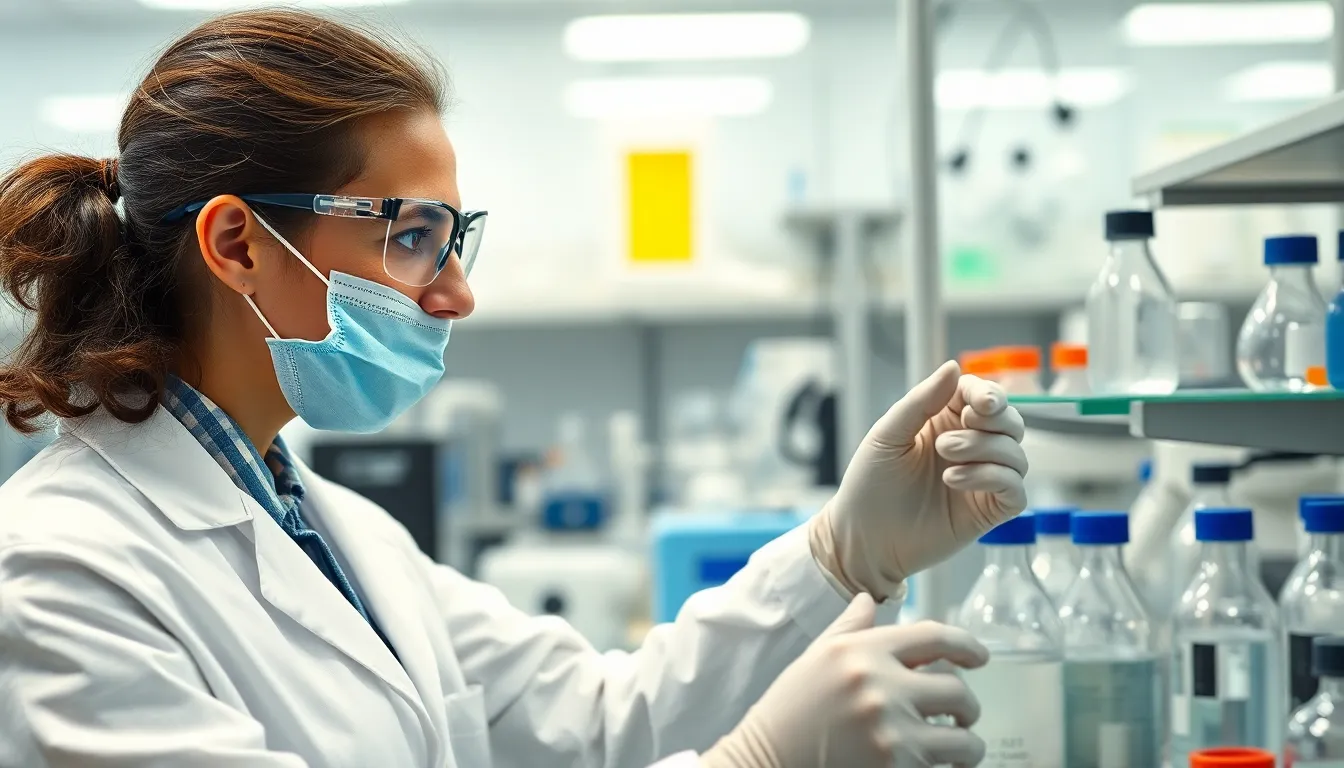In the fast-paced world of biotech, quality control specialists are the unsung heroes. They’re like the detectives of the lab, ensuring that every vial and petri dish meets the highest standards. Without them, we’d be left wondering if that new miracle drug is more “miracle” or just a “mystery.”
Imagine a world where your life-saving treatments are produced without a safety net. Scary, right? That’s where QC specialists step in, armed with their lab coats and a keen eye for detail. They don’t just check boxes; they safeguard the future of medicine. With their expertise, they help transform groundbreaking research into reliable products that can change lives. So, if you’ve ever wondered who keeps the biotech industry on its toes, look no further than the quality control specialists. They’re the guardians of quality, ensuring that innovation doesn’t come at the cost of safety.
Table of Contents
ToggleOverview of QC Specialist Biotech
QC specialists play a vital role in the biotech industry by ensuring that laboratory products consistently meet rigorous safety and quality standards. Their work supports the development of innovative medical treatments while safeguarding public health.
Role and Responsibilities
QC specialists conduct various tests to verify that biotech products align with regulatory requirements. They perform batch releases, ensuring that each product meets predetermined specifications. Additionally, specialists document findings meticulously, addressing discrepancies and collaborating with teams to resolve issues. Routine audits of laboratory processes help maintain compliance with industry standards. Training and mentoring junior staff also fall within their responsibilities, promoting a culture of quality throughout the organization.
Skills and Qualifications
A strong foundation in life sciences remains essential for QC specialists. Educational backgrounds typically include degrees in biology, chemistry, or related fields. Analytical skills enable them to interpret complex data effectively, while attention to detail ensures accuracy in testing methods. Understanding of Good Manufacturing Practices (GMP) is crucial for compliance. Furthermore, proficiency in laboratory instruments and software enhances productivity, allowing specialists to streamline quality control processes. Communication skills foster collaboration across interdisciplinary teams, critical for maintaining product integrity.
Importance of Quality Control in Biotechnology

Quality control plays a vital role in the biotechnology sector. QC specialists ensure that all laboratory products adhere to stringent safety and quality standards, which is crucial for public health.
Ensuring Compliance with Regulations
Regulatory requirements dictate product quality within the biotech industry. QC specialists conduct rigorous testing to verify that products meet these standards. They meticulously document results to demonstrate compliance. Such documentation becomes essential during audits by regulatory bodies. Maintaining a documented quality system fosters trust between manufacturers and regulatory agencies, ensuring that products released to market are safe and effective.
Impact on Product Safety and Efficacy
Product safety significantly impacts patient outcomes and public health. QC specialists assess materials and processes to identify potential risks early. By conducting thorough evaluations, they help guarantee that each product meets safety and efficacy standards established by regulatory authorities. Non-compliance can lead to severe consequences, including product recalls and health hazards. Thus, their role directly influences the reliability of medical treatments and innovations in the biotech field, safeguarding both patients and the industry.
Tools and Techniques Used by QC Specialists
QC specialists in biotech rely on various tools and techniques to ensure product integrity and compliance with regulatory standards.
Laboratory Equipment
Laboratory equipment plays a critical role for QC specialists. Instruments such as spectrophotometers measure the concentration of substances, while chromatographs separate components in a mixture. Microscopes allow for the examination of biological samples at a cellular level. Additionally, incubators create controlled environments for growing cultures. Autoclaves sterilize equipment and materials to prevent contamination. Each piece of equipment enhances the accuracy and reliability of tests, ensuring quality control protocols are met consistently.
Quality Control Software
Quality control software streamlines data management and analysis for QC specialists. Such software tracks test results, manages compliance documentation, and facilitates audit trails. Users can generate reports with ease, promoting transparency and accountability. Integration with laboratory instruments enhances data accuracy by minimizing manual entry errors. Furthermore, these tools support regulatory compliance by simplifying the documentation process and ensuring all required data is readily accessible. Employing quality control software reduces the risk of non-compliance and enhances overall operational efficiency.
Career Path and Opportunities
Many pathways exist for quality control specialists in the biotech sector. These professionals enjoy diverse opportunities across pharmaceuticals, diagnostics, and research institutions.
Educational Requirements
A bachelor’s degree often serves as the foundational requirement for a QC specialist in biotechnology. Relevant fields include biology, chemistry, or biochemistry. Some positions may necessitate advanced degrees, such as a master’s or Ph.D., particularly for roles involving research. Certifications from recognized organizations also enhance qualifications, demonstrating expertise in quality assurance processes and regulatory standards.
Job Outlook and Salary Expectations
The job outlook for QC specialists remains robust, with the Bureau of Labor Statistics projecting growth in related fields. Increasing demand for novel therapeutics and diagnostics fuels this expansion. Salaries vary based on experience and location; entry-level positions typically start around $50,000 annually, while experienced specialists can earn over $90,000. Competitive compensation packages often include benefits such as health insurance and retirement plans.
Quality control specialists are indispensable to the biotech industry. Their expertise not only ensures that products meet rigorous safety and quality standards but also plays a pivotal role in advancing medical innovations. By conducting thorough testing and maintaining strict compliance with regulations, they safeguard public health and bolster trust in biotechnological advancements.
As the demand for reliable medical treatments continues to grow, the need for skilled QC specialists will only increase. Their unique combination of scientific knowledge and meticulous attention to detail positions them as vital contributors to the success of biotech companies. Investing in the development of these professionals will ultimately enhance the industry’s capacity to deliver safe and effective solutions for patients worldwide.



